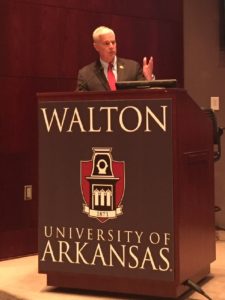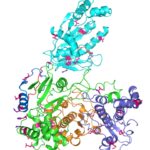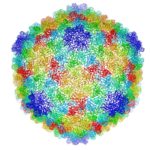John Kuriyan, senior faculty biologist in the Molecular Biophysics and Integrated Bioimaging Division, was named the recipient of The Protein Society 2017 Stein and Moore Award. With this award, Kuriyan is being recognized for his scientific discoveries that have led to understanding the regulation of eukaryotic cell signaling and the phenomenon of processivity in DNA repair.
Biosciences Area Participates at DOE National Lab Day in Arkansas
 DOE National Lab Day was organized on April 18, 2017 at the University of Arkansas in Fayetteville. The goal of the event was to provide exposure to the capabilities and mechanisms for collaboration at the DOE National Laboratories.
DOE National Lab Day was organized on April 18, 2017 at the University of Arkansas in Fayetteville. The goal of the event was to provide exposure to the capabilities and mechanisms for collaboration at the DOE National Laboratories.
Jay Keasling, Associate Laboratory Director for Biosciences, Mary Maxon, Biosciences Principal Deputy and Corie Ralston, Molecular Biophysics and Integrated Bioimaging’s Deputy Director for Science participated at the event. During their opening remarks, Arkansas Congressmen Steve Womack (pictured) and Bruce Westerman highlighted the national significance of the Labs. Stanford University’s Arun Majumder, Founding Director of the Advanced Research Projects Agency – Energy (ARPA-E), described energy innovation as a key aspect of our future, and Deputy Laboratory Director Horst Simon represented Berkeley Lab as part of a panel of National Lab Directors who illustrated many of the opportunities available at the National Labs. Maxon moderated a Bioscience and Healthcare breakout session and Keasling moderated a breakout on Renewables and Biofuels.
Cate among Five Lab Scientists Named New AAAS Fellows
 The new American Academy of Arts and Sciences (AAAS) fellows include Biosciences’ Jamie Cate from the Molecular Biophysics and Integrated Bioimaging Division. The other Berkeley Lab scientists honored are Christopher Chang (Chemical Sciences), Roger Falcone (ALS), Michael Witherell (Lab Director), and Katherine Yelick (Computing Sciences). AAAS fellowships recognize leading figures in academia, the arts, science, business, and government. Read more in the Berkeley Lab News Center.
The new American Academy of Arts and Sciences (AAAS) fellows include Biosciences’ Jamie Cate from the Molecular Biophysics and Integrated Bioimaging Division. The other Berkeley Lab scientists honored are Christopher Chang (Chemical Sciences), Roger Falcone (ALS), Michael Witherell (Lab Director), and Katherine Yelick (Computing Sciences). AAAS fellowships recognize leading figures in academia, the arts, science, business, and government. Read more in the Berkeley Lab News Center.
Researchers Gain Insight into Protein Critical to Zika Virus Reproduction
Zika virus is a mosquito-borne infectious disease linked to certain birth defects in infants in South and Central America and the United States. A Lawrence Berkeley National Laboratory (Berkeley Lab) researcher, Banumathi Sankaran, worked as part of a multi-institutional team led by Cheng Kao, professor at Indiana University, and Pingwei Li, associate professor at Texas A&M University (TAMU), to map a key viral protein called NS5. Necessary to virus reproduction, NS5 contains two enzyme activities: one reduces the body’s ability to mount an immune response against infection and the other helps start the genetic replication process.
Cryo-Electron Microscopy Achieves Unprecedented Resolution Using New Computational Methods
Cryo-electron microscopy is a critical tool used to advance biochemical knowledge. Now Pavel Afonine, research scientist, and Molecular Biophysics and Integrated Bioimaging Division Director Paul Adams have extended cryo-EM’s impact further by developing a new computational algorithm that was instrumental in constructing a 3-D atomic-scale model of bacteriophage P22 for the first time. Read more in the Berkeley Lab News Center.
- « Previous Page
- 1
- …
- 55
- 56
- 57
- 58
- 59
- …
- 78
- Next Page »
Was this page useful?








